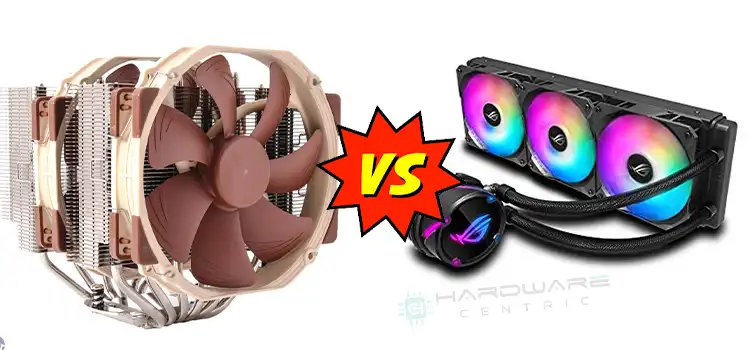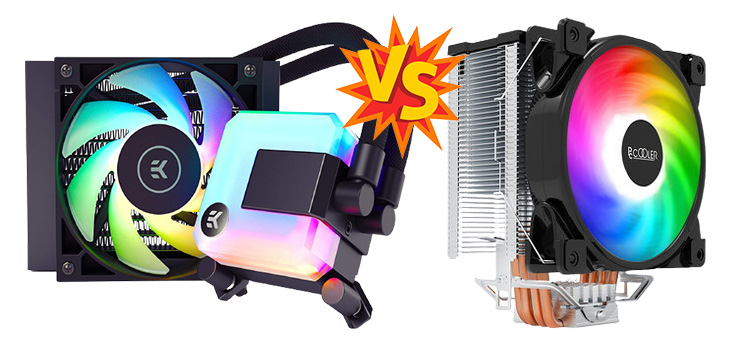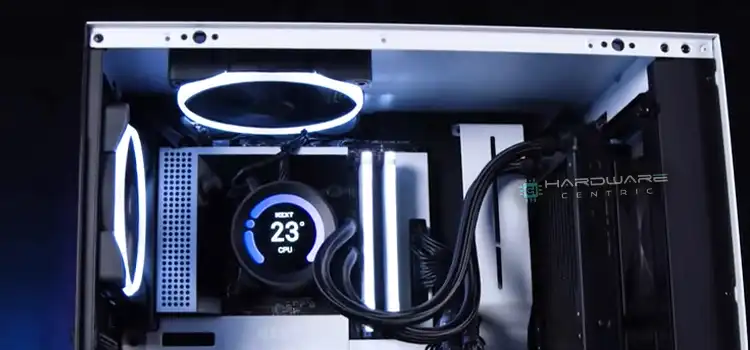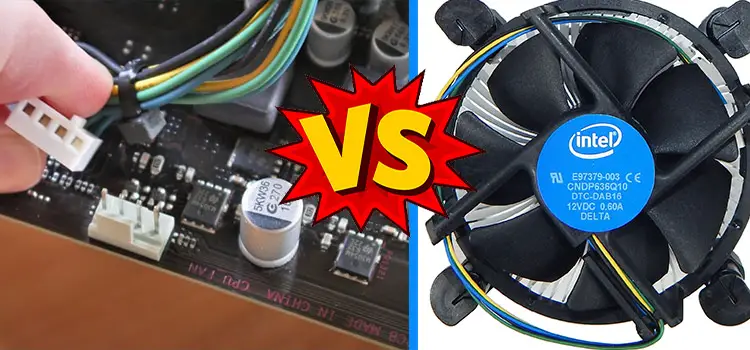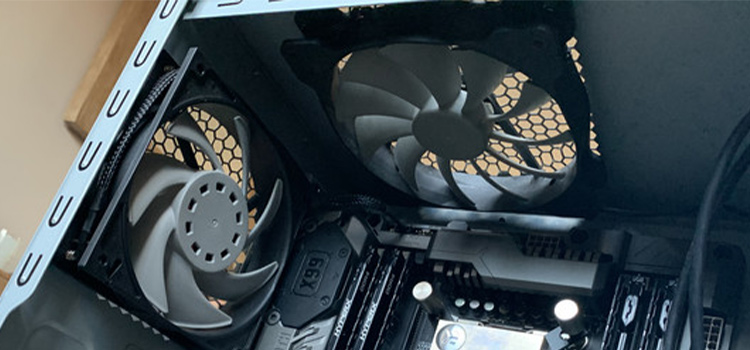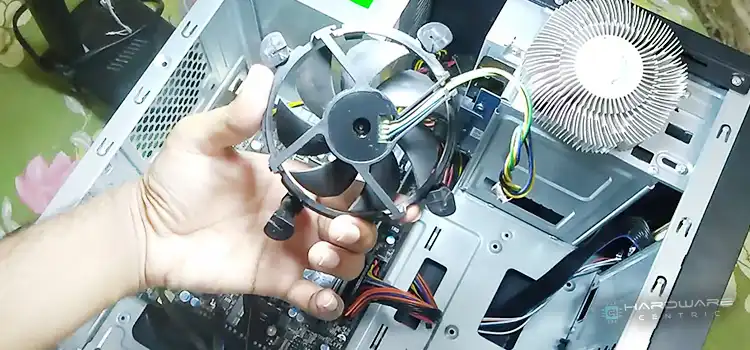80MM Fan vs 120MM Fan | Comparison Between Them
The size of the fan that is best for cooling a computer is debated among computer enthusiasts. Some argue that an 80mm fan is superior because it spins quicker, moving more air. Others argue that a 120mm fan is superior since it can circulate more air at a slower speed while producing less noise. It is ultimately up to the individual to determine which size fan is appropriate for their needs.
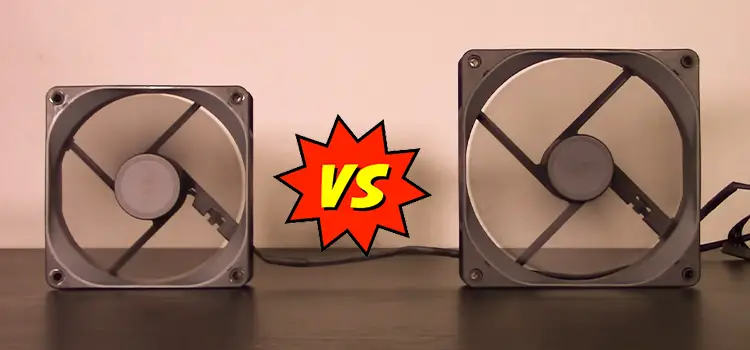
When looking for cooling fans, it’s easy to become confused. The first thing you’ll notice is that both 80mm and 120mm fans come in low and high noise types. Without further inspection, it can be difficult to discern what makes one better than the other, but before we get into the intricacies, let’s look at what makes these fans different in the first place.
80 MM Fan Details

While the widths of 120mm and 80mm are comparable, the heights can differ. This can alter how your fans blow air and how far they travel. For example, when positioned in exhaust positions (one blowing air out, one pulling it in), an 80mm fan normally covers 10% less surface area than a 120mm fan due to its lower size. Because of this feature, employing two-80s on either side of your case instead of two-120s may be more efficient.
120 MM Fan Details

When most people think about computer cooling, they imagine 120 mm fans. These fans can be found in a variety of applications, including typical PC cases and graphics card coolers. These fans are particularly efficient at creating massive amounts of airflow due to the increased size of the blades. This implies that your components will experience far less noise, vibration, and heat.
80MM Fan vs 120MM Fan – Which One?
Read the analysis and decide which one to select.
(A) Analysis of 120MM Fans
Here are some things to think about while buying 120mm fans.
1. Broader Blades
Larger fans with larger blades will be more powerful and circulate more air, but they will also be louder. Smaller fans’ blades are shorter and weaker, which means they may not be able to deliver as much airflow as larger fans. Choose a larger fan if you want greater power from your cooling equipment. If you want something quieter, go with a smaller one.
2. Move More Air
If it moves more air, choose the larger choice. There are a few more things to think about. Larger fans produce more noise than smaller fans since they have larger motors and take up more area. So, if the room isn’t an issue, bigger is always preferable.
3. Louder
On the other hand, The larger size of the fan provides more air circulation, which can lower temperatures in hotter locations. While they are noisier than smaller fans. They may be more appropriate in high-heat circumstances when this is less of an issue.
4. More Costly
While fans in the 80mm and 120mm sizes are both considered to be quite inexpensive, their pricing can vary significantly depending on the company. It’s vital to remember that the size of your computer case will determine which size is appropriate for you, so measure your case first before making a decision. You could be tempted to acquire an 80mm fan if it’s less expensive, but it won’t help if it doesn’t fit in your case.
(B) Analysis of 80MM Fans
Here are some things to consider while using 80 mm fans.
1. Reduce Vibration
There are two kinds of fans: larger and smaller. Larger fans produce more vibration, but they are more powerful. Smaller fans are less powerful but produce less vibration. The type of fan you choose depends on your priorities; the goal is to select the one that is best for you.
2. Less Energy Is Required
Smaller fans save energy. The larger the fan blade, the more power is required to spin it. An 80mm fan uses less energy and makes less noise than a 120mm fan. Furthermore, when it comes time to replace your smaller motors and components, they are frequently substantially less expensive.
3. Fit Into Narrower Spaces
The size of the blades on a fan is typically used to determine its size, hence an 80mm fan will have smaller blades than a 120mm fan. Tiny fans produce more airflow than bigger fans, making them ideal for usage in smaller places such as HTPCs (Home theater PC).
One widespread misconception is that because the air does not go as far, it is quieter. On the other hand, Larger fans can be quieter since they spin slower, causing less turbulence and hence less noise.
4. Remove Heat From Electronic Components as Quickly as Possible
On the other hand, Smaller fans transfer heat away from electronic components faster due to less wind resistance. Because they spin at a lower speed, smaller fans are also quieter than bigger ones. Before selecting a fan, take into account the size and quantity of vents on the computer case. Vents near the top of the case should be prioritized to guarantee proper airflow.
Advantages of 80MM Fan Over 120MM Fan
The size of an 80mm fan is an advantage over a 120mm fan. They are substantially smaller and can fit into narrower locations than bigger 120mm fans, making them more adaptable. They also have lower loudness and are generally quieter, which some people prefer. It can also move the same quantity of air at lower speeds, therefore it may use less power than a 120mm fan of equivalent size and speed rating.
Disadvantages of 80MM Fan Over 120MM Fan
Both are efficient in their own right, but the bigger size of the 120mm fan delivers more airflow and cooling capability, making it more appealing to many. However, it also raises the cost. Another disadvantage of the greater size is that it requires more storage space than its smaller cousin.
Frequently Asked Questions and Answers
What Are 80MM Fans For?
An 80mm fan is ideal if you need something small but effective. Typically, 80mm fans are used to cool PCs and laptops. There are more types and designs available for 80mm fans than for 120mm fans. They are available in a variety of shapes and sizes, such as box-shaped, slimline, and low profile.
Are 80MM Fans Loud?
80mm fans are not noisy. They are widely used as cooling fans in computers, PC cases, power supplies, and laptop coolers because they can move a lot of air without being too noisy.
Are Bigger Fans Better?
A larger fan does not always outperform a smaller one. More power may be required in some cases, but in general, two considerations decide which size of the fan will work best for your application: airflow and static pressure.
The volume of air the device moves over time is referred to as airflow. The weight of air being pushed against anything in relation to its distance from the object being pushed against is referred to as static pressure.
Last Words
A 120mm fan typically lasts three to five years before needing to be replaced. In comparison, an 80mm fan has a lifespan of less than a year when used on a regular basis.
If your cooling needs are on the lower end, this may not be as required. When picking between these two sizes, consider how frequently the room will be utilized as well as the power of the object that has to be cooled.
Subscribe to our newsletter
& plug into
the world of PC Hardwares
